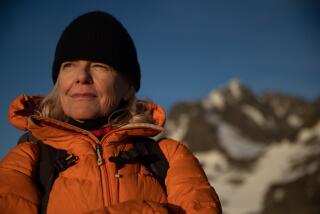COUPLE TRACK THE KING OF BEASTS
- Share via
Imagine spending your honeymoon with thousands of turtles in Costa Rica, or being wet to your ears in a tropical rain forest for a year, or stalking a pride of lions through South Africa 15 hours a day for eight months.
Welcome to the world of Carol and David Hughes, who, in their 15 years of working in wildlife cinematography, have won an Alfred I. du Pont Award in broadcast journalism, an Emmy Award and numerous other national and international honors.
Among other TV programs, they were responsible for “Etosha: Place of Dry Water” (1981) and “Rain Forest” (1983).
Occasionally, they get out of Africa, and a couple of weeks ago they came to Los Angeles to edit their latest project, “Lions of the African Night,” which is set to air next February on PBS’ “National Geographic” series.
Co-produced by the National Geographic Society and WQED-TV in Pittsburgh, “Lions of the African Night” chronicles a pride of 30 lions and uncovers the activities of creatures great and small in the lions’ path.
The Hugheses worked by themselves in Kruger National Park in Namib, Africa, for three years to make the documentary. Dedication and patience helped them capture on film what is usually hidden by the dark. Using million-candle power lights, they were able to record the nocturnal activities of the animals.
After a while, the animals “got so used to the light that it wouldn’t change their behavior,” Hughes added.
Although the proximity to the animals could have been dangerous, there were no close calls, they said, but some of the playful teen-age cubs learned to test the relationship with the film makers.
“They were so close to us we could have grabbed their tails had we been stupid enough,” Hughes said.
The cubs managed to wreck some camera gear and pop a few tires, so the film makers “coated the tires with Vaseline so that the tires wouldn’t taste very good,” Hughes said.
Because of the reputation they have built over years of working in the government-owned, 800 square-mile Kruger National Park (they also recently built a home on the outlying area of the park), the Hugheses are offered wide freedom in their research there.
“I don’t want to draw too much attention to it,” Hughes said, “because others might wonder why they don’t get the same treatment.”
The political turmoil in South Africa has not affected their work, but it forces them “to keep abreast of what goes on in that area because we do all our work down there.”
“I would love to do a film on the Zamimbi, but that would be crazy. There are wars in all that area,” Hughes said. The area transverses Angola.
David Hughes, a native South African, was getting his Ph.D. in zoology at the University of Miami when he met Carol, a native of Great Britain who was working for the university. The couple married and began their wildlife filming.
Their first project together took them to the islands off Costa Rica to study and film turtles native to the region. When they returned, they faced the decision of where to sell the film.
The dilemma was whether to choose “National Geographic” or the commercial networks. They chose “National Geographic,” which re-edited the film, “adding wall to wall people, wall to wall music and narration,” Hughes said. “We would just shut our eyes to it because that was the conventional way of thinking for those of us selling to the U.S. market.”
However, the BBC liked the work so much they sent the couple back to Costa Rica for another program on turtles, and so their career began in earnest.
With a few films under their belt, they discovered that the National Geographic Society edited and remixed less and less of their work. The turnaround has been so great that the latest production has no people and little music.
Today the Hughes have a semi-exclusive agreement with WQED, the Pittsburgh PBS station, thanks to a grant from Chevron, which underwrites the “National Geographic” series.
But making wildlife documentaries is not the way to get rich. They keep the outtakes from their “National Geographic” specials, but it isn’t much to sell elsewhere. “We have been just making it,” Hughes said. “We have been cutting it close.”
Once the editing here was completed, they planned to head back to Africa and take a break before plunging into their next project, described vaguely as “the little things behind the big things.”
As to the future, they want to continue doing what they love. “We would still do this even if we won the lottery,” Mrs. Hughes said.
More to Read
Sign up for The Wild
We’ll help you find the best places to hike, bike and run, as well as the perfect silent spots for meditation and yoga.
You may occasionally receive promotional content from the Los Angeles Times.





